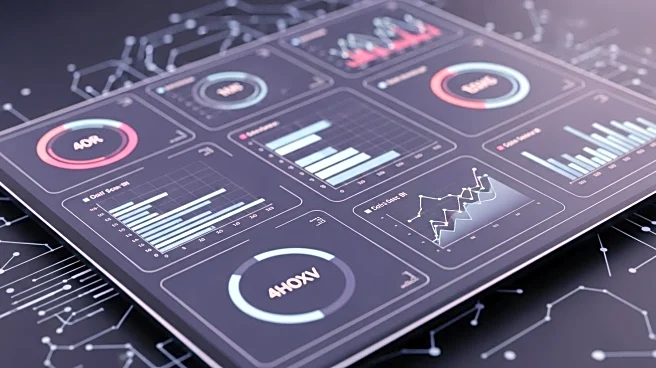What is the story about?
What's Happening?
The global Self-Service Business Intelligence (BI) market is anticipated to grow significantly, reaching $12 billion by 2031, with a compound annual growth rate (CAGR) of 14.5% from 2025 to 2031. This growth is driven by the increasing adoption of data democratization strategies, allowing non-technical users to create reports and analyze data independently. The market is expected to hit $4.5 billion in 2024, highlighting strong growth potential. Key players such as Tableau Software, Microsoft, Qlik, IBM, and SAP are integrating AI and automation to enhance the usability of self-service BI tools. The demand for agile decision-making and real-time analytics is propelling adoption across various industries, including retail, healthcare, and financial services.
Why It's Important?
The expansion of the Self-Service BI market is crucial for industries aiming to optimize operations and improve performance through data-driven decision-making. As organizations prioritize digital transformation, these tools enable employees to access and analyze data without heavy reliance on IT departments, fostering a culture of innovation and efficiency. The integration of AI and automation in BI tools enhances their effectiveness, making them indispensable in competitive, data-centric markets. This growth reflects a broader trend towards empowering employees with the tools needed to make informed decisions, ultimately driving business success and competitiveness.
What's Next?
The market is expected to play a central role in digital transformation strategies, with vendors focusing on enhancing security features and collaboration options. As industries continue to adopt self-service BI solutions, the market will likely see increased investment in research and development to create next-generation products. The ongoing integration of AI and IoT will further expand the scope of self-service BI applications, supporting long-term market expansion.
Beyond the Headlines
The rise of self-service BI tools also raises questions about data security and governance, as more employees gain access to sensitive information. Organizations must balance the benefits of data democratization with the need to protect data integrity and privacy. Additionally, the shift towards self-service BI reflects a cultural change within organizations, emphasizing the importance of data literacy and continuous learning.


















